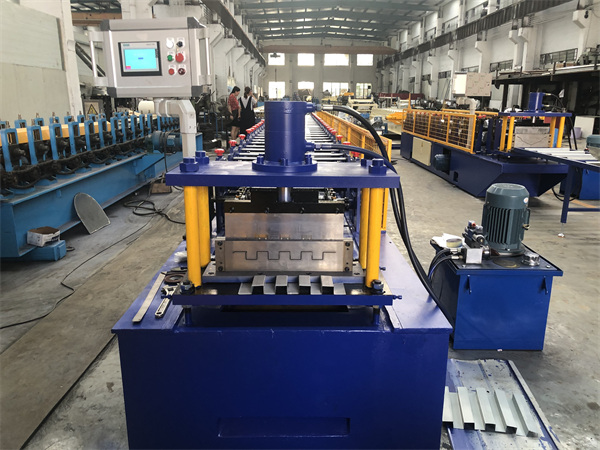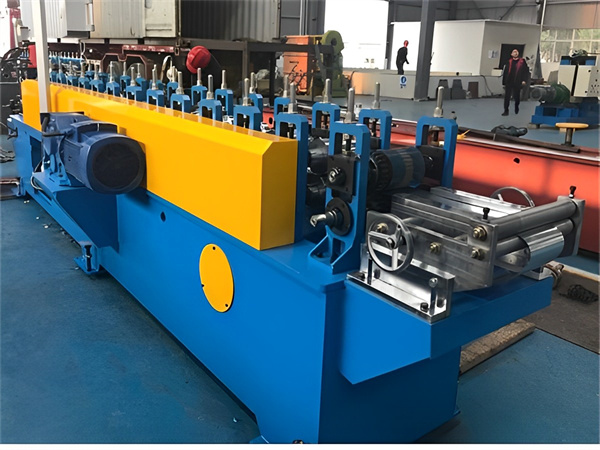Roofing tile roll forming machines are essential equipment for manufacturing metal roofing tiles and panels. This guide provides a comprehensive overview of roofing tile roll formers covering how they work, types, key components, specifications, applications, installation, operation, maintenance, suppliers, costs, pros and cons, and more.
Overview of Roofing Tile Roll Forming Machines
Roofing tile roll forming machines, also known as roof panel roll forming machines, are used to convert flat metal sheets into roofing tile profiles and panels. The roll forming process involves gradually bending and shaping the sheet metal through a series of rollers until the desired roofing profile is formed.
Roll formed metal roofing tiles are lightweight, durable, corrosion resistant, fireproof, and cost-effective. They are an economical alternative to traditional clay or concrete roofing tiles. The raw material for roofing tile roll forming is typically galvanized steel, zinc-aluminum coated steel, aluminum, or copper. The most common profiles produced are interlocking tiles, corrugated tiles, and standing seam panels.
Roll formed roofing provides excellent protection from weather elements while reducing roof weight load. Other benefits include quick and easy installation, long service life, and low maintenance. Roofing contractors, building material suppliers, metal building manufacturers, and panel integrators use these machines widely.

How Does a Roof Tile Roll Forming Machine Work?
A roofing tile roll former works by feeding a coil of flat sheet metal through a series of roller stations. Each roller station incrementally forms the sheet into the desired roof tile profile through a bending and folding operation.
The sheet metal is passed through the roller sets at a constant speed and gets gradually shaped from its original flat form into the final roofing product shape. The number of roller stations required depends on the complexity of the profile. Simple profiles like corrugated sheets may require 10-12 stations while complex profiles need 16-20 stations.
The rollers are precision machined to accurately shape the metal without defects. They bend and mold the material through a progressive series of small steps which avoids overstressing the material. The key components of a roll former include an uncoiler, feed table, forming rollers, cutting unit, and exit table. The formed tiles can be collected for further processing or directly packed for shipment.
| Types | Characteristics |
|---|---|
| Interlocking tiles | Interlock on all four sides, lightweight, easy installation |
| Corrugated tiles | Sinusoidal or wave pattern, drainage channels, high strength |
| Standing seam | Raised seams, no exposed fasteners, watertight |
| Shingle tiles | Overlapping edges, aesthetic appearance |
| Box profile | Square or rectangular ribs, high strength, span larger distances |
| V-rib profile | V-shaped ribs for directional buckling resistance |
| Applications | Uses |
|---|---|
| Roofing | Sloped roofs for residential, commercial buildings |
| Wall cladding | Exterior walls, architectural facades |
| Interior paneling | Decorative wall and ceiling panels |
| Flashings | Roof edges, joints, protrusions |
| Canopies | Shades, carports, awnings |
| Partitions | Interior dividers, fencing |
Specifications and Design
Roofing tile roll forming machines are available in different sizes and production capacities to meet application requirements. The main specifications and design considerations are outlined below:
| Specifications | Details |
|---|---|
| Forming speed | 50-120 m/min |
| Forming width | 1000-2500 mm |
| Thickness capacity | 0.15-1.2 mm |
| Power consumption | 15-80 kW |
| Roller material | Steel, alloy steel |
| Roller hardness | 50-65 HRC |
| Roll stations | 10-20 |
| Roll design | Flower pattern, straight line |
| Raw material | Steel, aluminum, copper |
| Coil weight | Max 25 tons |
| Coil ID | 400-650 mm |
- Forming speed determines output and typically ranges from 50-120 m/min depending on complexity of profile.
- Forming width is the effective working width and determines sheet width capacity. Common sizes are 1000, 1250, 1500, 2000, and 2500 mm.
- Thickness capacity ranges from 0.15 to 1.2 mm. Thicker materials may require bigger machines.
- Power consumption depends on speed and profiles. Larger units may require up to 80 kW.
- Rollers are made of steel or alloy steel hardened up to 65 HRC. Flower pattern rolls improve formability.
- Number of roll stations should match profile complexity. More stations allow more gradual bending.
- Raw material can be galvanized steel, aluminum, or copper. Material properties impact quality.
- Coil weight determines how often new coils need to be loaded. 25 tons is common for roofing lines.
- Inner coil diameter ranges from 400-650 mm. Bigger ID coils require de-coilers.
| Installation | Operation | Maintenance |
|---|---|---|
| Level machined foundation | Continuous speed monitoring | Daily cleaning and oiling |
| Secure anchoring | Guide alignment checks | Roller surface inspection |
| Power supply connections | Feed sheet centering | Roller realignment |
| Trial running | Monitoring formed tiles | Bearing lubrication |
| Parameter tuning | Tooling inspection | Mechanical drives service |
| Safety checks | Calibration to specs | Electrical and hydraulics checks |
- Proper foundation leveling avoids vibration issues during high-speed running.
- Firm anchoring prevents machine movement and deformation during forming.
- Power supply should be stabilized and regulations followed.
- Trial runs are needed to verify quality and tune parameters before production.
- For operation, constant monitoring of speed, feeds, and guides alignment is required.
- Daily cleaning and oiling maintains smooth operation and prevents corrosion.
- Periodic roller surface inspection for wear and regrinding to keep tolerance.
- Realigning rollers periodically compensates for deflections under load.
- Bearing, gearbox, and hydraulics require scheduled lubrication and servicing.
- Electrical components and wiring need to be checked for heating or damage.

Choosing a Roofing Tile Roll Forming Machine Supplier
Choosing a reliable roofing tile roll forming machine supplier is key to getting capable equipment and good after-sales service. Here are important factors to consider when selecting suppliers:
| Parameter | Details |
|---|---|
| Experience | Years in business, clientele, installations count |
| Capabilities | In-house design, tooling, and manufacturing |
| Flexibility | Customization to needs, new profile development |
| Quality | Certifications, consistency, client reviews |
| Cost | Pricing, shipping, taxes, installation support |
| Support | Operator training, maintenance, troubleshooting |
| Response time | Technical queries and service issues |
| Warranty | Coverage period, terms and conditions |
- Experience counts when choosing machinery suppliers. Look for extensive years in business and number of successful installations.
- Seek out suppliers with in-house engineering design expertise and manufacturing capabilities.
- Prioritize suppliers who offer flexibility for customization and new profile development.
- Review certifications and client feedback to ascertain consistent quality standards.
- Compare pricing models including shipping, taxes, and installation support.
- Good suppliers provide operator training, maintenance advice, troubleshooting guides.
- Quick response time to technical queries and service reflects good support.
- Optimal warranty coverage for parts, labor, period instills confidence.
Roofing Tile Roll Former Costs
Roofing tile roll forming machine prices vary significantly by size, production capacity, level of automation, included features, brand reputation, and other aspects. Here is an overview of typical price ranges:
| Capacity | Price Range |
|---|---|
| Small < 30 m/min | $8,000 – $15,000 |
| Medium 30-60 m/min | $15,000 – $35,000 |
| Large 60-100 m/min | $35,000 – $55,000 |
| Heavy Duty 100+ m/min | $55,000 – $120,000 |
| Additional coil handling | $4,000 – $8,000 |
| Automated cut-off, stacking | $8,000 – $15,000 |
| Profile changeover parts | $3,000 – $6,000 per profile |
- Small roofing tile roll formers < 30 m/min cost between $8,000 to $15,000.
- Typical mid-sized machines from 30-60 m/min range from $15,000 to $35,000.
- Larger high speed lines from 60-100 m/min are $35,000 to $55,000.
- Heavy duty 100+ m/min automated lines cost $55,000 to $120,000.
- Additional coil loading and unloading parts add $4,000 to $8,000.
- Automated cut-off and stacking features increase price by $8,000 to $15,000.
- Profile changeover parts and tooling cost $3,000 to $6,000 per profile.
- Regional factors and customization also impact pricing. Quotes from multiple vendors is recommended.
Pros and Cons of Roofing Tile Roll Forming Machines
Here are some key advantages and limitations of roof tile roll forming machines:
| Pros | Cons |
|---|---|
| Fast production speeds | High initial investment cost |
| Consistent quality and precision | Regular maintenance required |
| Variety of profiles and materials | Skilled labor for operation |
| Lower long term roofing costs | Profile changeover downtime |
| Lightweight, durable roofing | Limitations on minimum bend radius |
| Reduced installation time and labor | |
| Energy efficiency, fire safety benefits |
- Fast production speeds up to 120 m/min allow high volumes.
- The process ensures consistent quality and precision.
- Various profiles and materials like steel, aluminum can be formed.
- Lower lifetime roofing costs compared to traditional tiles.
- Formed tiles are lightweight yet very durable.
- Quick installation with reduced labor due to interlocks.
- Better energy efficiency and fire safety versus alternate roofing.
- High initial machinery investment cost.
- Regular maintenance of rollers and motors needed.
- Skilled operators required for quality standards.
- Profile changeover causes downtime.
- Limitations on minimum bending radius.

FAQ
| Question | Answer |
|---|---|
| What materials can be roll formed? | Steel, aluminum, copper, zinc, titanium, brass. With surface treatments like color coating. |
| What thickness range is possible? | 0.15 mm to 1.2 mm typically. Thicker sheets may require bigger capacity. |
| How many roofing profiles are possible? | Many – interlock, corrugated, standing seam, v-rib, box rib, and more. |
| How long do roll forming machines last? | With regular maintenance, over 20 years lifespan. |
| What factors affect production speed? | Material grade, thickness, profile complexity, line automation. |
| What causes low quality outputs? | Worn rollers, inadequate power, uncentered feeds, incorrectly tuned parameters. |
| How quick are profile changeovers? | 1-3 hours typically. Quick change tooling reduces this. |
| WhatAngles range of roof slopes possible? | Up to 70 degree slopes can be accommodated with correct panel design. |
| How is panel length determined? | Lengths from 2 ft to 50 ft possible depending on site and transport requirements. |
| What colors are available? | Through coatings nearly any color is possible like red, green, gray, brown, white etc. |
Conclusion
Roofing tile roll forming provides an economical and efficient method of producing metal roofing tiles and panels to replace traditional clay or cement tiles. With design flexibility, durable products, quick installation and lower lifetime costs, roll formed roofing promises growth. This guide covers key aspects of the roll forming process, machinery, operational best practices, costs and benefits to help manufacturers evaluate adopting the technology. With skilled operators and proper machine selection, roofing tile roll formers can deliver rapid payback on investment.
